- Home
- Rabindranath Tagore
Letters From a Young Poet 1887 1895 Page 5
Letters From a Young Poet 1887 1895 Read online
Page 5
Often the sentences in these letters are very long, unbroken except for the successive commas or dashes,* continuing in their meandering way as they follow the thread of a thought:
The ferries cross the river, travellers with umbrellas in hand walk by the road next to the canal, women immerse their wicker baskets and wash rice, the farmers come to market with bundles of tied jute on their heads—two men have flung a tree trunk on the ground and are splitting its wood with an axe, making a ṭhak-ṭhak sound, a carpenter works upon an upturned fisherman’s boat under an aśvattha tree, repairing it with a chisel in hand, the village dog roams around aimlessly by the canal, a few cows lie lazily on the ground in the sun, swishing away flies with a languid movement of their ears and tails before they feed upon excessive amounts of fresh grass, and when the crows sitting on their backs irritate them beyond endurance, they shake their heads at them and express their annoyance.
The cinematic image has a predecessor in such a paragraph, and the correspondences with the slow-panning camera movement in Satyajit Ray’s visualization of village life in the Apu Trilogy cannot be coincidental. Along with the beauty of the camera’s movement across this scene is the accompanying soundtrack that records, exactly and mesmerizingly, the incandescent nature of background sounds in the Bengal countryside; again something that Ray did path-breaking work on in his films. In a letter from Shahjadpur in 1893 Rabindranath records:
The few monotonous ṭhak-ṭhak ṭhuk-ṭhāk sounds of this place, the cries of the naked children playing, the high-pitched tender songs of the cowherds, the jhup-jhāp noise of the oars, the sharp, sad sound of the oil mill hitting the nikhād note, all of these sounds work together and are in a sort of proportion to the bird call and the sound of the leaves—all of it seems to be some part of a long dreamlike sonata full of peace and enveloped in pity, somewhat in the mould of Chopin, but composed and bound to a very vast, spread-out, yet restrained metre.
The sensory is a source of delight, always. Again and again, he gives his thanks for being able to absorb with his senses the marvel of just being in the world; as he put it in a song many years later: kān petechi, cokh melechi, dharār buke prāṇ ḍhelechi/jānār mājhe ajānāre karechi sandhān,/bismaẏe tāi jāge āmār gān. (I hear, I see, I pour out my heart upon the breast of this earth/I have searched for the unknown in the midst of the known,/That is why my song awakens to wonder).
Repeatedly, he mentions the rustle of nature: ‘This light and this air, this half-melancholy, half-happy feeling, this continuous trembling in the leaves of trees and fields of grain—’, the ‘shivering sound’ of coconut fronds, or of the leaves of the śisu trees in the south garden. On a Bolpur October day, when ‘the endless cooing of the pigeons from within the dense mango orchards turns the entire field and sky and wind and dreamlike long hours of the dappled afternoon into a song of separation’s sorrow’, he feels that ‘even the sound of the clock on my table seems to have merged with the tender melancholy of the afternoon’s rustle of sound’. That feeling comes to him with special intensity in the afternoons (‘These afternoons have made me fervent with feeling from my very childhood’), like a drone that resembles the buzzing of bees, bearing memories of his life, which have travelled to him ‘borne upon a curious mixed rustle of sound’ from very far away. The ancient Greek described by Hegel with which Barthes ends his brief essay ‘The Rustle of Language’ might well be a description of the poet Rabindranth: ‘He interrogated, Hegel says, passionately, uninterruptedly, the rustle of branches, of springs, of winds, in short, the shudder of Nature, in order to perceive in it the design of an intelligence.’14
The responsiveness of this man to the sensory does not need the idylls of the countryside to find expression. In a letter from Calcutta in March 1895, he speaks of a morning spent in utter idleness, and of how, yet, he feels ‘no regret at all for this laziness’—for ‘this basanta morning breeze really wastes me’. He continues:
Just letting this generous warm wind caress the whole body seems like a duty worth doing—it seems as though the flow of this sweet breeze is a conversation that nature holds with me. That I was born in this world, that the spring breeze came and touched me, that the smell of the kanakcāňpā flower filled my head, that occasionally a morning such as this came to me in obeisance like a message from the gods—in the brief life of a man, how can this be insignificant!
Ruminating on the fact that ‘all these forgotten unconscious moments too are an important part of a successful life’, he has no regrets about the idle enjoyment of the morning, and also thinks, ‘If this time had been spent in listening to a good song one would not have regretted that either.’
Songs are woven into this tapestry of letters like a recurrent motif; we see him write, compose, sing and reflect upon music repeatedly. Music and painting are two fields analogous to Rabindranath’s poetic vocation that benefit from Theodor Adorno’s remarks on the expressionism of Paul Klee, Franz Marc and Wassily Kandinsky and the music of Arnold Schoenberg, Alban Berg and Anton Webern in ‘On the Relationship between Painting and Music Today’. ‘A rebellion against reification’ was how Adorno described the impulse of refusing any ‘compartmentalization of the objective spirit’s zones’ in these artists, and while Rabindranath’s creative accomplishments in these fields still await such inspired theorization, the fact that he forged an idiom in his painted work which, likewise, considered ‘the material, indeed the sphere of aesthetic objectification itself, insignificant alongside the pure self-articulation of the subject’ is evident to any viewer of his artwork. But that was much later. Now, in the years these letters are being written, he had not yet launched his career as an artist, although he reveals that, secretly, he wants to be a painter too, even though he is ‘well known’ as a ‘colour-blind person’:
And then again, if one swallows one’s pride and tells the absolute truth, then I have to admit that that thing called painting—I’m always looking towards it with the lustful glances of unrequited love—but there’s no hope of winning it, the age for wooing it is past me now. Unlike the other knowledges, one cannot hope to acquire it easily—to attain it is like breaking the mythical bow; you cannot win its favour until you exhaust yourself with repeated strokes of the paintbrush.
The ‘repeated strokes of the paintbrush’ he mentions are with regard to the sort of painting being done at the time by Ravi Verma, whose paintings are mentioned in these letters, or, indeed, by his nephew Abanindranath Tagore. His subsequent discovery of the work of the Bauhaus painters—Klee and Kandinsky among them—that he was then instrumental in bringing to Calcutta in an exhibition in 1922 perhaps set him free from his own conventional notions, allowing him to refashion ‘similarity to the object’ in visual art.
The Land
Written from a variety of locations, as he travelled on work or on holiday, with family or on his own, the letters contained in this book are intensely visual, recording a landscape and countryside that contain, for the young man who writes of them, a narrative of discovery and belonging; and if he had been like Nehru in temperament, he too might well have called this very different book The Discovery of India. Even though a few of these letters were posted from London or Calcutta, the vast majority of them were from the towns and villages and even rivers of Bengal, and the litany of place names mentioned at the head of the letters may be said to constitute a poem in itself—from his boat on the Ichamoti or from Shahjadpur or Shilaidaha, from Boalia, Bolpur or Baliya to Cuttack, Dighapatia, Patishar or Natore.
The road or path so beloved of him, used so often as a metaphor in his poems and songs, here becomes incarnate; thus we have letters written ‘On the way to Kushtia’, ‘On the road to Goalundo’ or ‘On the waterway to Dighapatia’. These place names now belong to Bangladesh, and that country has found new ways to reinvent the poetry of this text. In a play created from Rabindranath’s letters in the Chinnapatrābalī titled Bāṇglār māṭi bāṇglār jal (Bengal’s Land, Bengal’s Water)
, itself a phrase from one of Rabindranath’s best-known patriotic songs, Sayyed Shamsul Haq has devised a drama with Rabindranath as the main character but, more crucially, with all the ordinary people he wrote of in these letters—Gofur Mian, Gagan Harkara, the members of the Sunītisancāriṇ Sabhā, the village postmaster, the boatmen, the revenue collectors—as the other characters who speak in their own distinctive dialects.15 The ordinary women of village Bengal, especially, are a source of constant wonder—not just their shyness or their beauty but also their strength and combativeness, as he observes how, although ‘hidden behind her veil’, one woman has a ‘voice like bell metal’ that emerges without a ‘trace of fear or anxiety’, and that in this she is representative of most of the others of her sex and class. The rich complexity of these letters resides also, then, as the playwright has seen, in the range of people who make an appearance in them and in the involvement of the writer observing them go about their daily lives.
The presence of water has an overwhelming charisma in the countryside described in these letters. Writing on the East Bengal landscape of his youth—the early twentieth century—in Bāṇgālī jībane ramaṇī, Nirad Chaudhuri comments that its beauty has a certain ‘vastness, glory and majesty’ about it that he puts down to Bengal’s waters. Eight of Rabindranath’s ‘greatest’ short stories, according to him, are written in close proximity to Bengal’s waters at this time, and the writing here, he feels, is as ‘generous and tender’ as the teardrop Rabindranath had envisaged as a metaphor for literary creativity in these environs. The life of the Bengali, according to Chaudhuri, resided in that landscape of ‘river, water, a free, generous and blue sky, in clouds as dark as kohl or as white as the swan, in rice fields stretching up to the horizon and dense green forests’.16 With Partition, that landscape has been lost, and with it the Indian Bengali has lost not only his natural wealth but also his heartbeat. For Rabindranath in these letters, however, that heartbeat of the water and the land in close conjunction with each other still resonates as he traverses ‘this shadowy Bengal, encircled by the embrace of its affectionate rivers’. Smaller rivers, huge awe-inspiring rivers, rivers that wind their way through the sleepy countryside, rivers made dangerous by strong currents or stupefied by the lack of any, quite still and without movement—the Ichamoti, the Gorai, the Yamuna, the Padma—make repeated appearances here. The river Padma is eulogized again and again—she is a beloved presence, a living presence, sometimes calm, as in the winter, but often angry and swollen and magnificent in the poet’s favourite season, the monsoon. The scenes on the shores of these rivers of domestic rituals, children’s play, women’s chatter, farmer’s work, ferries plying, all find a mention as Rabindranath’s boat moves through their everyday lives and practices, forward on a journey called life.
Nature is a living presence here; it is vibrant and perceptible, a third who walks beside him. While strolling along the moonlit sandbanks of the Padma by night, he resents the company of two acquaintances:
The three of us are walking together, but for a while I am not in their presence as they walk. My serious, silent, moonlight-drowned world suddenly lets me know in the momentary break of conversation,’ ‘Don’t think you have only two companions, we too are by your side today as we have always been before—’
Such instances are not rare, but recur:
After discussing the arrangements for the transfer of property to another name on the rent roll, etc., for a while, the moment he stopped speaking—I suddenly saw the eternal universe standing silently in front of me that evening.
‘I have a certain human domestic relationship with nature here, a certain intimate familial feeling—which no one knows but me,’ he says one evening in August 1894 from his boat on the Padma. Intimacy with nature is fervently expressed and deeply felt; nature is often personified: as a veiled bride, as his gṛhalakshmī, as companionate partner and lifelong friend—someone who strokes his hair, touches his body, embraces him, gives him refuge. His attachment to this earth is palpable:
This enormous world that is lying quietly over there—I love it so much—I feel like clutching its trees, rivers, meadows, noise, silence, dawn, dusk, all of it to me with both hands. I think: the treasures of this world that the world has given us—could any heaven have given us this?
What is the meaning of such desire? In a different letter, he realizes he doesn’t have an answer: ‘I don’t quite understand what the desire entwined in it is—it’s like a pulsating attachment with this vast earth—at a time when I was one with this world, when the green grass rose on top of me, the śarat sunlight fell over me, when every pore of my green body—spread across enormous distances—let off the fragrance and heat of youth …’ A sentiment Rabindranath expresses time and time again in his songs is recorded here as fact: ‘This world is constantly new to me, like someone I have loved for a very long time and over many lives; there is a very deep and far-reaching relationship between the two of us.’
Ranajit Guha calls the connection between Rabindranath and nature expressed in his letters and songs ‘antaraṅga ātmiẏatā’, an intimate relationship. The perception of nature as an ‘autochthonous entity’ has a ‘particular local impulse’, and is felt most keenly by Rabindranath, he thinks, in the evenings and afternoons of certain seasons—that feeling of the revealed character of nature is related to a feeling of immediacy.17 In a famous letter (Letter 142), Rabindranath had compared the ‘world of the day’ to ‘European music’ and ‘the world of the night’ to ‘our Indian music, a pure, tender, serious, unmixed rāginī’. But if evening and night have an immediate existence here as companionate presences, dwarfing the humans in his proximity with their living presence, in these pages in particular, it is the afternoons that reappear most often with a felt intensity. The ‘intense attraction’ that the ‘afternoons here’ in Shahjadpur hold for him is described: ‘The sun’s heat, the silence, the solitude, the call of birds, especially the crow, and the long, beautiful leisure—all of it entangled together makes me very detached and yet emotional.’ This immersion of self in the torpor of still afternoon sunlight has affected him, he says, ‘right from his childhood’, and here it seems that ‘I want to write about the same thing every day—the afternoons over here. Because I just cannot surmount the attraction they hold for me. This light, this air, this silence enters my pores and mixes with my blood—this is newly intoxicating for me each day, I cannot say enough to exhaust the tender intensity of it.’
Light, and space, and air are like an addiction in the pages of these letters. Again and again, he speaks of these things being as essential to him as the oxygen in one’s lungs. ‘The sky, the light, the air and song have come together from every direction and loosened me up and absorbed me within themselves’, he writes from Shilaidaha in 1892. Writing from the boat on the way to Boalia in the śarat sunlight of September 1894, he exults:
How I love the light and the air! Perhaps because of the appropriateness of my name. Goethe had said before he died: More light!—if I had to express a wish at a time like that I would say: More light and more space!
Goethe is mentioned often, and another quotation is given twice in the original German in the same letter (Entbehren sollst du, sollst entbehren), as though the music of the words was important enough for the line to be quoted in German alongside the English translation. He speculates:
If you want to keep the heart’s faculties of sight, sound, touch and thought vigilant, if you want the ability to receive all that you can receive to remain sharp, you must keep the heart always hungry—you have to deprive yourself of abundance. I have kept something Goethe said always in mind—it sounds simple, but to me it seems very deep—
Entbehren sollst du, sollst entbehren.
Thou must do without, must do without.
… That’s why the relative comfort of Calcutta begins to prick me after a short while, as if its small pleasures and enjoyments were making it difficult for me to breathe.
Frugal
ity of habit and extravagance of feeling, inner emotion and outer delight, leisure and work, land and water, the everyday and the eternal—each mode of being is contradicted and complimented by its opposite in the pages of this book of letters. Such a correspondence is a form of literary extravagance possible only when a surplus of thought and emotion accumulates. Other forms of literature remain the author’s and are made public for his good; letters such as these that have been given to a private individual once and for all become the reader’s with an intimacy that is therefore characterized by a more generous abandonment. What they do, above all else, is allow us to savour with some immediacy the plangent feeling of being in the presence of a young poet within the radiant particularity of time and place inhabited so intensely by him here.
1
Darjeeling
September 1887
We’ve only just reached Darjeeling. Beli behaved very well on the way.* Didn’t cry a great deal, although she did holler and create a commotion, and ululated as well, and turned her hands around and called out to the birds, though one couldn’t see where the birds were. There was a great fuss while boarding the steamer at Sara ghat. Ten o’clock at night—thousands of things, very few coolies, five women, and only one man. After crossing the river we managed to get on to a small train which had four sleepers while we (including Makhan) were six human beings. The women and all the extra things were loaded on to the ladies’ compartment—the statement is brief, but the doing of it wasn’t quite so simple. There was a huge amount of calling and shouting and running around involved—still, Na-didi says I didn’t do a thing.† That is, a full-grown man like me, accompanying five women, should have done a great deal more of calling and shouting and running around, and should have sometimes got off here or there on the platform to stride around spouting Hindustani. That is, it would have been much more appropriate for me to have become the image of what happens when one whole man gets wholly incensed—that would have been more befitting of a real man. Na-didi was utterly disappointed with my cool demeanour. But in these two days I have opened so many boxes and closed them again and shoved them underneath benches and then pulled them out again from the same place, and I have chased after so many boxes and bundles, and so many of these boxes and bundles have followed me around like a curse, so many have been lost and so many found again, and so many not found again and then so much effort expended in trying and continuing to try for their retrieval, in a way that no twenty-six-year-old son of polite parents has had fated to happen to him. I’m sure I’ve developed box-phobia—when I see a box, my teeth start chattering. When I look all around me and all I see are boxes, only boxes, small, big, medium, light and heavy, wooden and tin and leather and cloth—one on top, one below, one on the side, one behind—then all my ordinary strength to call and shout and run around ebbs away—and then if you see my vacant gaze, drawn face and poor aspect you’ll think me a downright coward—therefore Na-didi’s opinion of me is quite correct—trapped in the midst of this variety and multiplicity of boxes, I was not myself. Tell Suren to draw a picture of me in this state. Anyway. After that I got into another compartment and lay down. That compartment had two other Bengalis in it. They had come from Dhaka—the moment you saw them you thought of them somehow as being from Dhaka [dhākāi]—one of the two had a head that was almost completely bald and speech that was extremely at an angle—he asked me, ‘Was your father on Darjeeling?’ If Lakhhi had been there she would have had an appropriate answer; perhaps she would have said: ‘He was on Darjeeling, but Darjeeling was feeling cold then, so he has gone home now.’ My reflexes couldn’t supply me with such Bengali.

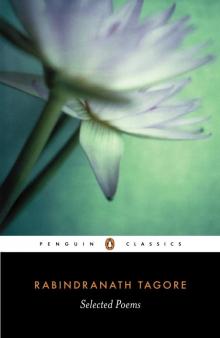 Selected Poems
Selected Poems The Lover of God
The Lover of God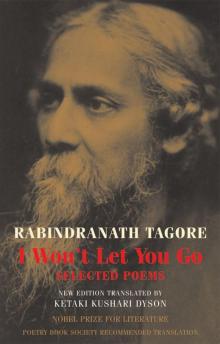 I Won't Let You Go: Selected Poems
I Won't Let You Go: Selected Poems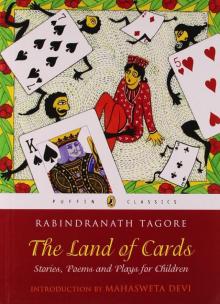 The Land of Cards: Stories, Poems, and Plays for Children
The Land of Cards: Stories, Poems, and Plays for Children The Tagore Omnibus, Volume One
The Tagore Omnibus, Volume One The Boat-wreck
The Boat-wreck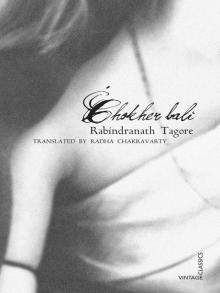 Chokher Bali
Chokher Bali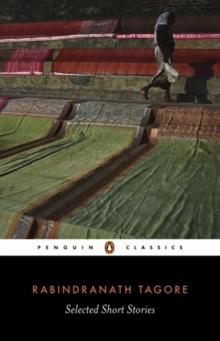 Selected Short Stories
Selected Short Stories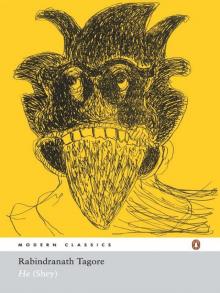 He (Shey)
He (Shey)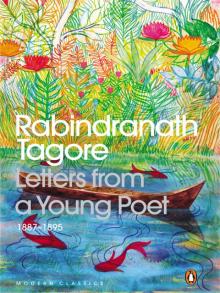 Letters From a Young Poet 1887 1895
Letters From a Young Poet 1887 1895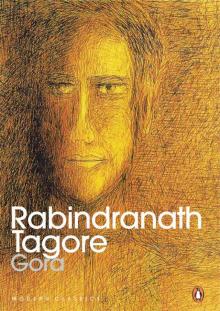 Gora
Gora Tagore Omnibus, Volume 1
Tagore Omnibus, Volume 1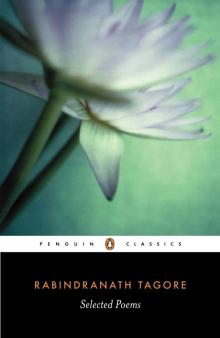 Selected Poems (Tagore, Rabindranath)
Selected Poems (Tagore, Rabindranath)